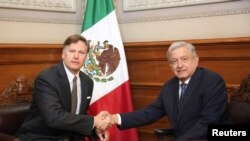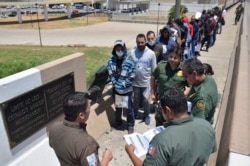Mexico's president said on Monday his country was "doing well" in addressing U.S. demands to contain migration and that Mexican and American officials will meet on Sept. 10 to take stock of the situation after a key deadline expires.
In June, Mexico's government averted a threat by U.S. President Donald Trump to impose tariffs on all Mexican exports by vowing to take tougher measures to curb a surge in U.S.-bound migrants within 90 days.
In late July, after an initial 45-day period to evaluate progress, U.S. Secretary of State Mike Pompeo praised Mexico's efforts, but said he would circle back with Trump about how to proceed.
The Trump administration has pressured Mexico to become a so-called safe third country for asylum seekers, which would require Central Americans to apply for refuge in Mexico rather than the United States.
Mexico has rejected that demand, saying the measure is inappropriate and unnecessary.
Mexican President Andres Manuel Lopez Obrador struck an upbeat tone at his regular morning news conference on Monday when he noted the 90-day period would conclude on Sept. 5.
"We're fulfilling the commitment we made... We're doing well," he said.
Foreign Minister Marcelo Ebrard echoed Lopez Obrador's optimism on Mexico's measures to curb the flow of migrants.
"I'd say they're now in a state close to normalcy," he told reporters, referring to migrant flows. He added that he would travel to Washington for the Sept. 10 meeting.
Migrant apprehensions on the U.S. southern border fell in June to about 100,000 people, according to U.S. data, after Mexico imposed new measures, including deploying militarized National Guard police to its borders.
Central American countries have also faced pressure from Trump to do more to slow migration.
Under threat of sanctions, Guatemalan President Jimmy Morales last month struck a "safe third country" agreement with the United States, meaning Hondurans and Salvadorans would be required to seek refuge in Guatemala, rather than proceeding north. But incoming Guatemalan President Alejandro Giammattei said the deal would have to be approved by both countries' congresses.
U.S. Acting Homeland Security Secretary Kevin McAleenan said earlier this month that the United States is pursuing "similar agreements" with Honduras and El Salvador.






